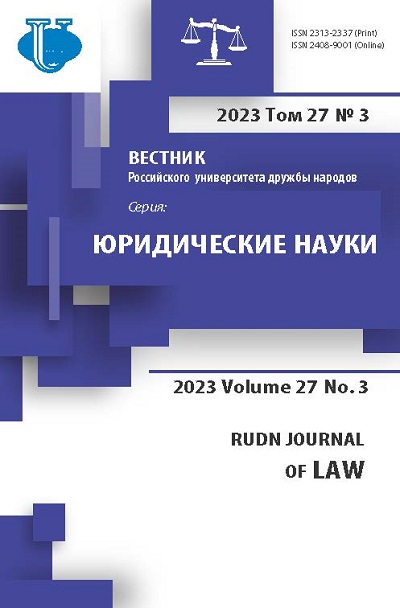The control over compliance with contractual preemptive rights
- Authors: Ulyanov A.V.1
-
Affiliations:
- Institute of Scientific Information for social sciences RAS
- Issue: Vol 27, No 3 (2023)
- Pages: 748-764
- Section: CIVIL AND LABOR LAW
- URL: https://journals.rudn.ru/law/article/view/36142
- DOI: https://doi.org/10.22363/2313-2337-2023-27-3-748-764
- EDN: https://elibrary.ru/JWXRRF
- ID: 36142
Cite item
Full Text
Abstract
The article focuses on the conditions and grounds for conducting the formal preliminary legal due diligence of a contract as to respect of the preemptive right, which had been granted by one of the parties to a stranger under an agreement. This legal due diligence may be hypothetically examined during state registration of rights or notarization of transactions. According to theory of law, reasons to do thus are scientific concepts of the general duty not to interfere with others' plans. Such plans may include an agreement under the terms of which one of the parties gets a preemptive right in relation to certain property. This contractual right ensures the entitled party that he/she may preclude the legal implications of agreements between the other party and the strangers (interveners). If these persons knew or should have known of the preemptive right and entered into an agreement, which is inconsistent with that right, such agreement shall be considered as invalid and therefore cannot be notarized and cannot be subject to state registration
About the authors
Aleksej V. Ulyanov
Institute of Scientific Information for social sciences RAS
Author for correspondence.
Email: aleksejulanov10741@gmail.com
Candidate of Legal Sciences, researcher of Department of Law Nakhimovsky prospect, 51/21, Moscow, 117418, Russian Federation
References
- Agarkov, M. M. (2002) The problem of abuse of right in Soviet civil law. In: Selected works on civil law in two volumes. Vol. 2. Complied by Belov, V.A. Moscow, Tsentr JurInfoR Publ. pp. 361-385. (in Russian).
- Alekseev, S.S. (2009) General theory of law. Moscow, Prospekt Publ. (in Russian).
- Asknaziy, S.I. (2008) Basic issues of the theory of socialist civil law. Moscow, Statut Publ. (in Russian).
- Belov, V.A. (2014) Essays on property law. Scientific and polemical notes. Moscow, Yurait Publ. (in Russian).
- Belov, V.A. (2017) European Contract Code: general and comparative law commentary in two books. Book 1. Moscow, Yurait Publ. (in Russian).
- Braginskiy, M.I. & Vitryanskiy, V.V. (2005) Contract law: General provisions. Moscow, Statut Publ. (in Russian).
- Fleyshits, E. A. (2015) Obligations arising from tort and from unjust enrichment. In: Makovskiy, A.L. (ed.). Selected works on civil law in two volumes. Vol. 2. Moscow, Statute Publ. pp. 309-443. (in Russian).
- Hayek, F. (2020) Law, Legislation and Liberty. A new statement of the liberal principles of justice and political economy. Translated from English by Pinsker, B. & Kustarev, A.; Kuryaev, A. (ed.). Moscow, Chelyabinsk, Socium Publ. (in Russian).
- Ioffe, O.S. (2009) Legal relations under Soviet civil law. In: Selected works on civil law: excerpts on the history of civil jurisprudence. Civil law relation. Criticism on the «economical law» theory. Complied by Makovskiy, A.L. & Shilokhvost, O.Yu. Moscow, Statut Publ. pp. 512-652. (in Russian).
- Karapetov, A.G. (2016a) An option to sign the agreement and option agreement according to the new edition of the Civil Code of the Russian Federation. Herald of Economic Justice. 3. 49-72.
- Karapetov, A. (2016b) Economic analysis of law. Moscow, Statut Publ. (in Russian).
- Luhmann, N. (1972) Rechtssoziologie. Reinbek bei Hamburg, Rowohlt.
- Matuzov, N.I. (1972) Person. Rights. Democracy. Theoretical aspects of subjective right. Saratov, Saratov University Publ. (in Russian).
- Protasov, V.N. (2020) Theory of legal procedure. Moscow, Yurait Publ. (in Russian).
- Puginskiy, B.I. (2008) Theory and practice of agreement-based regulation. Moscow, Zertsalo-M Publ. (in Russian).
- Rawls, J. (2010) A theory of justice. Translated from English by Tselishchev, V.V. (ed.). Moscow, URSS Publ. (in Russian).
- Reutov, V.P. (1972) Revisiting the dispositive powers in Soviet law. Bulletin of Perm University. 3(264), 159-172. (in Russian).
- Rückert, J. (2011) Preface to Russian edition of «System of modern Roman law» of F.C. von Savigny. In: Kutateladze, O. & Zubar’, V. (eds.). System of modern Roman law: in eight volumes. Vol. 1. Translated from German by Zhigulin, G. Moscow, Statute Publ. pp. 248-254. (in Russian).
- Savigny, F.C. von (2011) System of modern Roman law: in eight volumes. Vol. 1. Translated from German by Zhigulin, G. Kutateladze, O. & Zubar’, V. (eds.). Moscow, Statute Publ. (in Russian).
- Shapiro, S. (2021) Legality. Translated from English by S. Koval’. Edited by A. Pavlov. Moscow, Gaidar Institute Publ. (in Russian).
- Sinitsyn, S.A. (2017) General system of absolute and relative civil rights: Diss. … of Doc. of Legal Sciences. Moscow, The Institute of Legislation and Comparative Law under the Government of the Russian Federation. (in Russian).
- Tretyakov, S.V. (2007) Generation of the concept of dispositive powers in German civil law doctrine (On the publication of the Russian translation of the work of E. Seckel "Secondary rights in civil law"). Civil law review. (2), 253-270. (in Russian).
- Vasilyev, A.M. (2021) Legal categories. Methodological aspects of developing the system of categories of the theory of law. Moscow, Norma Publ. (in Russian).
- Weber, H. (2009) Security obligations. Translated from German by Alekseev, Yu.M. & Ivanov, O.M. Moscow, Wolters Kluwer Publ. (in Russian).
- Weber, M. (2013) Selection. The Protestant Ethic and the Spirit of Capitalism. Moscow, Saint Petersburg, Centre for Humanities Initiatives Publ. (in Russian).
- Yakovlev, V.F. (2012) Civil law method of the regulation of social relations. In: Selected works. Moscow, Statut Publ. 3-185. (in Russian).
Supplementary files















